In this episode I talk about my story, how I came to create the Beyond The Cusp workshops and my purpose behind having these conversations.
In this episode I talk about my story, how I came to create the Beyond The Cusp workshops and my purpose behind having these conversations.
Welcome to Episode 1 of the Beyond The Cusp Podcast. In this episode I talk about the reason behind this podcast, that is to start talking about things that have been taboo and breaking it all down.
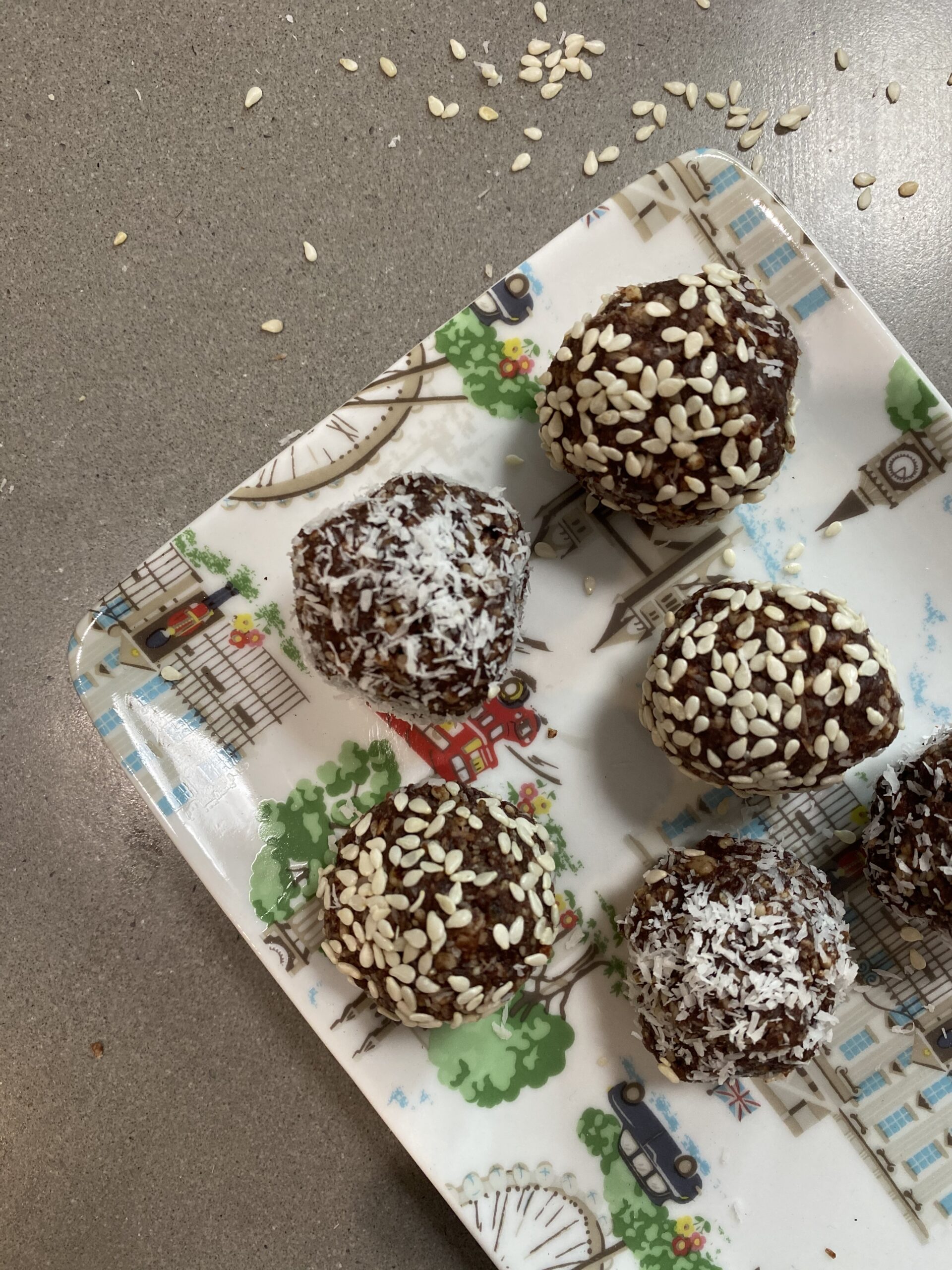
I recently asked on instagram if anyone was interested in a recipe to help keep tween and teen moods in check. The answer was an overwhelming yes!
So here it is.
On the video below I share info of how these ingredients help, so make sure to have a look.
– 3/4 C seeds and nuts. I used a mix of sesame and sunflower seeds, as well as cashews here. Flax seed and Pumpkin seeds are also great, especially in the first half of your menstrual cycle.
– 1/2 C desiccated coconut
– 1/4 C raw cacao, you can use up to 1/2 C if you like it really rich
– 10 medjool dates
– 1 Tbs coconut oil
– Up to 1/4 C water – extra sesame seeds and coconut for covering
Blitz the seeds and nuts in a food processor until flour consistency. Add dates, coconut, coconut oil and cacao and mix until all combined. Slowly add water until a thick enough consistency to roll into clean balls. Not too wet. Cover in sesame seeds or coconut. Keep in the fridge.
Enjoy!
Remember, also, that low blood sugar brings on the hangries. For me too! So keep these in the fridge for quick go to’s when there’s “nothing to eat”.
These balls are packed with B vitamins, zinc, magnesium, iron and amino acids, all essential for brain health. These ingredients help stimulate dopamine, create serotonin and are fabulous mood boosters.
https://www.facebook.com/beyondthecuspau/videos/1342916445907224/
Dates: Dates are a good source of vitamin B6. B6 is one of many B vitamins required for proper production of neurotransmitters – our brain chemicals and messengers. GABA, dopamine, and serotonin all require B6 for synthesis.
Cacao: Raw cacao contains polyphenols, which support brain health and are a great mood food. Salsolinal is also present in raw cacao, which stimulates the pleasure neurotransmitter dopamine. It is also one of the highest plant sources of magnesium.
Sesame Seeds: Sesame seeds are high in tryptophan. Tryptophan helps your body produce the neurotransmitter called serotonin, which helps you feel at ease. It’s been heavily researched that many people suffering from anxiety or depression have low levels of serotonin
Sunflower Seeds: sunflower seeds contain amino acids that creates high levels of serotonin, they are also high in magnesium
Flaxseed: Flaxseeds are high in Omega 3 acids. Omega-3 fatty acids are emerging as an effective therapy for mood disorders
Pumpkin Seeds: Pumpkin Seeds contain tryptophan, which is needed to make serotonin. Serotonin not only makes you happy, but also helps make melatonin, which regulates your sleep and wake cycles. It is also high in Magnesium
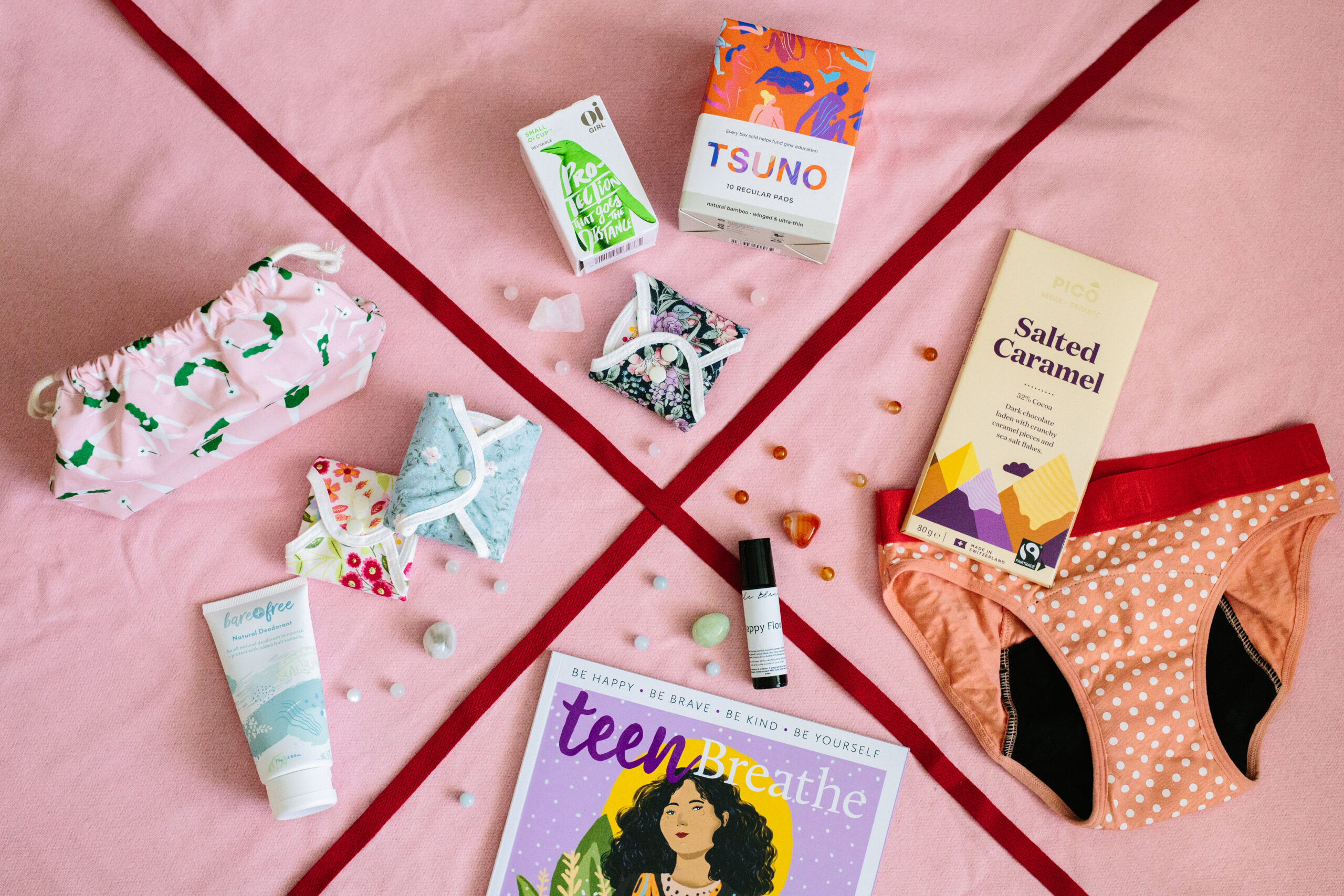
Being prepared for your daughters first period with a first period pack will help her feel more at ease, as well as ensure we are not caught out when it does arrive. The average age of a first period in western culture is 12, however some girls start their period as young as eight, so it’s best to be prepared at any age.

2. Add some pads. Pads are most likely the first option to be used. Think sustainable and organic if possible. Sometimes these options may not be available in stores, but there are many great options available online. Often these come as a subscription service, so you place the order once and they are delivered to your door monthly or quarterly, no need to get caught out again. Remember when you get them to show her how to use them. Open the product, show her how to stick them to her knickers, how often she might need to change, and then how to dispose of them.
Some of my favourite disposable brands are:
Resuable brands:
3. A spare pair of knickers. These can be normal underwear, or period underwear which she can either use additionally to pads, or on their own. Take a look at
4. An essential oil roller. For those days when cramps are hitting and she needs a bit of ease. Something containing Clary Sage is perfect to help relax the cramping of the uterus. Roll oil direclty over the uterus, or onto pulse points.
Mama Flow from Wilde Blends is a beautiful oil that helps support, soothe and provide temporary relief for cramps, hormones, nausea, emotional mood swings and stress which are sometimes associated with period cycles in women.
Remember that painful periods are common, but they are not normal. If pain cannot be managed through simple techniques, and are stopping you practicing normal daily activities, this could be a sign that there is something not quite right and advice from a GP should be sought.
5. A non-toxic deodorant. If she is nearing to start her period, chances are that she is also starting to sweat a bit more, and therefore possibly smell. Look for a deodorant that does not contain aluminium or other toxins that could disrupt her hormones. Thankfully now there are some wonderful options for all natural deodorants. Sometimes it may take some trial and error as to what works for you, but its worth it.
Some wonderful natural options include:
6. Other smaller items could include:
You can do this together. Find a bit of time together this weekend to sit down together and create a little pack all ready to go for when her first period does arrive.
You can find ready made period packs to purchase here
I’d love to see what you come up with. Tag me on instagram @beyondthecusp to show me your Period Prep packs.
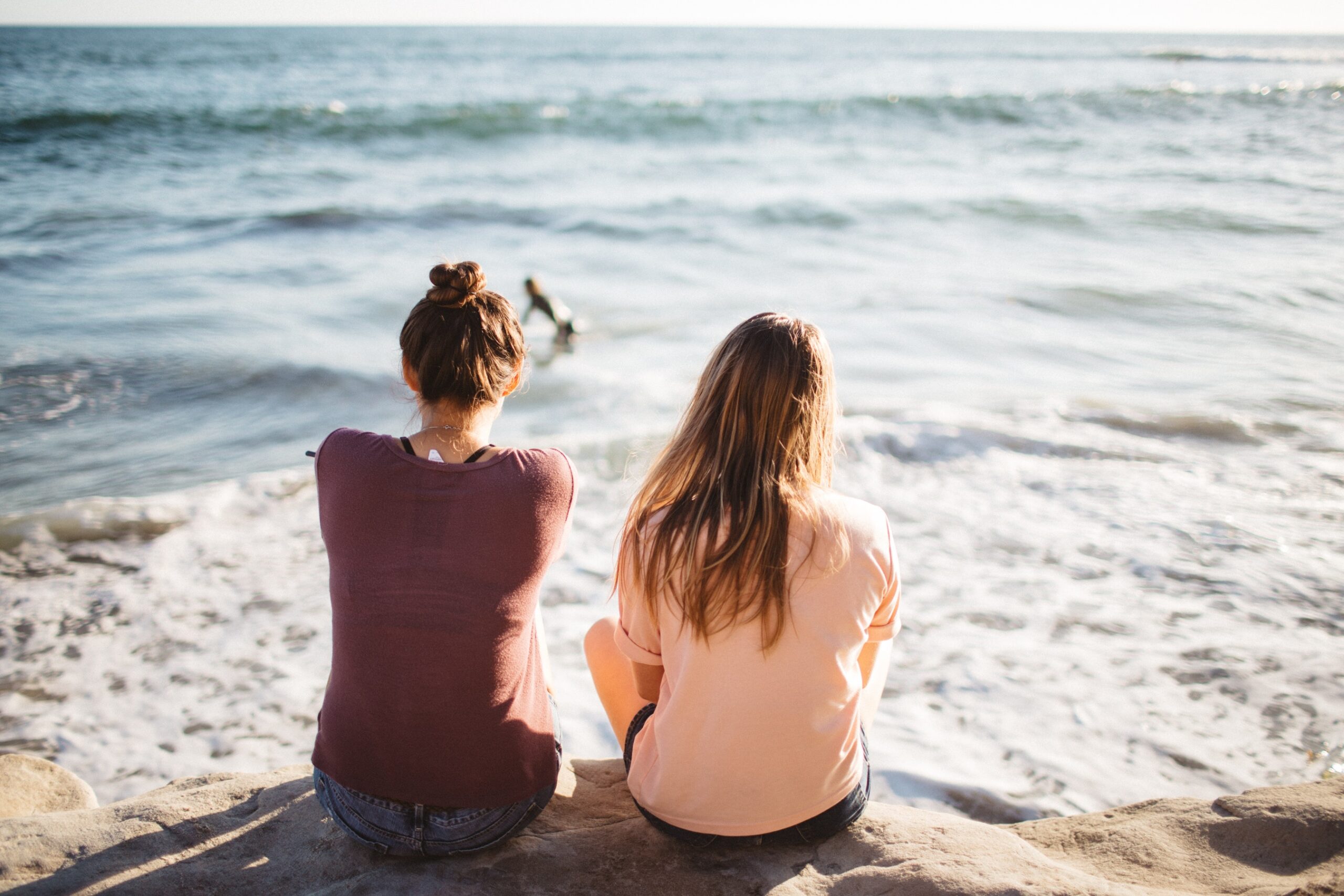
When girls first start their period, and potentially for the following 2-3 years, their cycles do not follow the 26-32 day norm that we are used to. Some things to remember.
– A normal cycle length for girls can be anywhere from 21-45 days, with an average cycle length of 32 days.
– The amount of days they have their period can also range from 1-7 days.
– The flow can change from cycle to cycle from light spotting to heavy.⠀⠀⠀⠀⠀⠀⠀⠀⠀
⠀⠀⠀⠀⠀⠀⠀⠀⠀
The key at this stage is to always be prepared with pads, undies, or whatever form of product you have chosen. Carrying emergency pads is always a good idea, and if the flow is heavy, wearing backup pads and undies.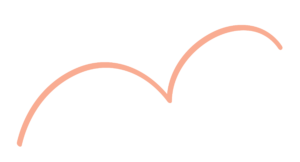
It’s also a great idea to start tracking their cycle at this point. It can often feel like you might have your period every week, or only every few months. But if they are tracking, they have a much better picture of just how often and how heavy each cycle is. Often changes in their moods and energy can be the first signs of an impending bleed. After a number of cycles they’ll get a much better idea of what is normal for them.
Tracking can either be done with an app like Clue App or My Flo, or just in a diary.
A good idea of what things to focus on each day include:
– What day they are on, EG, day 1 of the cycle is the first day of bleeding
– How heavy the flow is, spotting, light, heavy.
– Any cervical fluid or vaginal secretions, if so, is it clear, stretchy like egg white, tacky.
– Food cravings
– Appetite in general
– Energy high or low
– Chatty or quiet
– Cramping
– Tender breasts
– Happy or sad
– Irritable
– Focused or distracted
– Productive or unproductive
– How does your hair and skin look?
Tracking your menstrua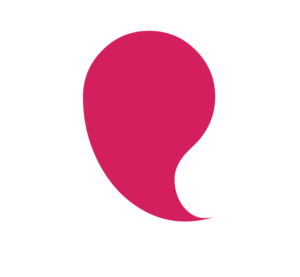 l cycle is not only about when you’ll get your period, it’s an overall look at your whole wellbeing. If things are going wrong hormonally, the menstrual cycle is often where the signs will first show up. With a good picture of how the menstrual cycle looks for each individual, you will be able to take these along to your health practitioners for the right support.
l cycle is not only about when you’ll get your period, it’s an overall look at your whole wellbeing. If things are going wrong hormonally, the menstrual cycle is often where the signs will first show up. With a good picture of how the menstrual cycle looks for each individual, you will be able to take these along to your health practitioners for the right support.
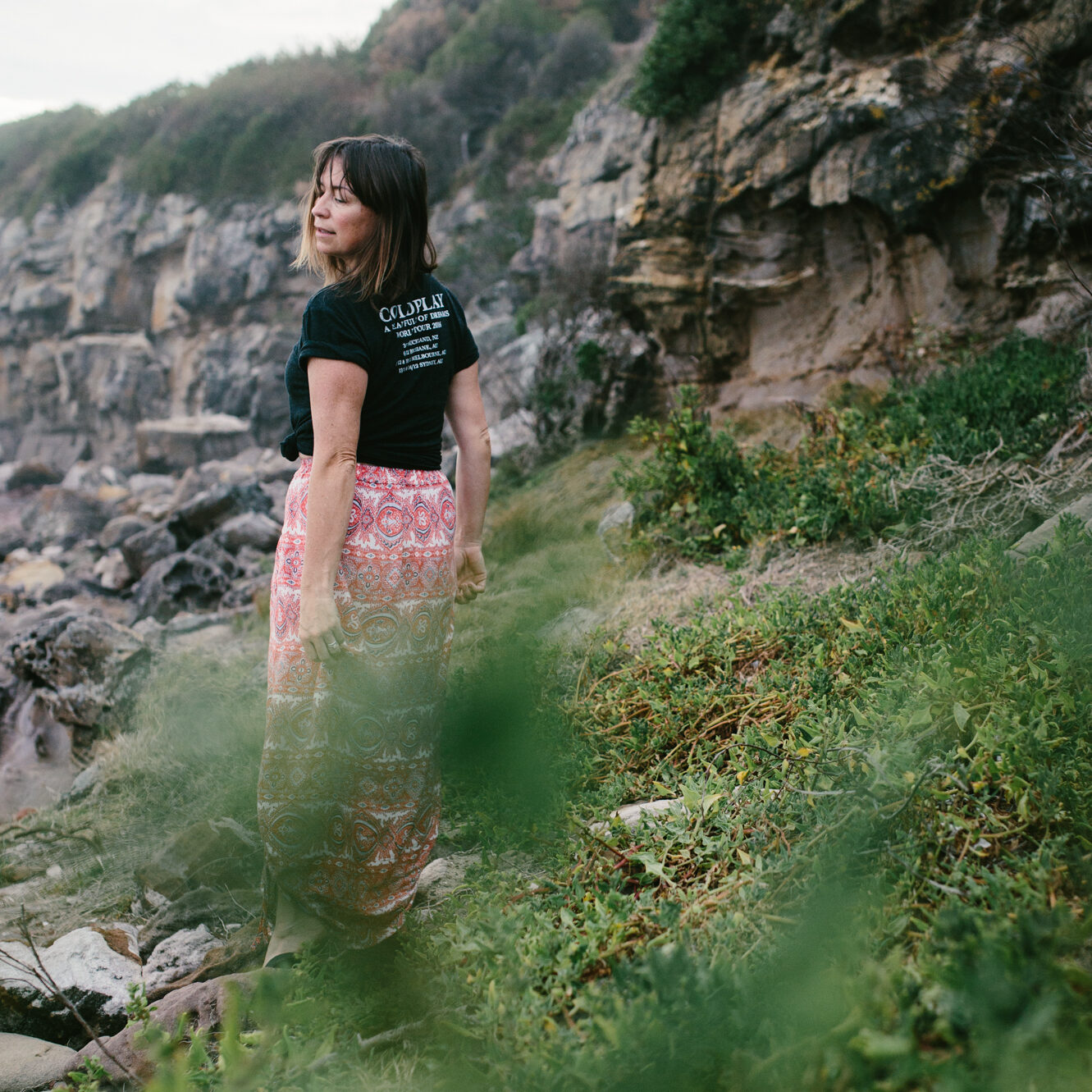
In part one I spoke about how learning about my menstrual cycle in my forties left me feeling sad and ripped off that I didn’t know these things earlier. I went through 20+ years of my life disconnected and uneducated about my body. I don’t want the same for my children.
But Beyond The Cusp is much bigger than that. There’s been other experiences, which have led me to this. Full disclaimer, this particular story has taken me over a year to put out there. I have resisted this a lot. Even as I have come to write this now, I procrastinated reading funny stories on Turia Pitts facebook post, which ironically has a very fitting message about playing big. In my head I can tell this story confidently over and over, but putting it to paper is a whole other story.
Note: This post comes with a trigger warning for sexual abuse.
There are two things I want to point out before I tell my story. Firstly, just like it is being discovered that the gut is the second brain, and much of our health is determined by our gut health, it’s thought that the womb space is our second heart (regardless of whether you still have a physical womb or not). We feel a lot from our womb space.
Secondly, as women, trauma is stored in our womb. Any abuse, shame or guilt, we have encountered (generally from a male) if not dealt with, is stored in our womb space. This may be controversial to some people, but many menstrual problems may be related to past trauma, guilt, fear, rejection of our femininity or a belief that our genitals are sinful, or dirty. I share this because from what I experienced, I cannot deny this.
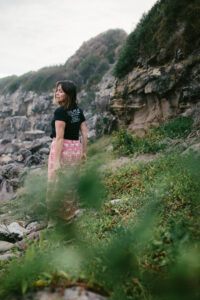 Becoming a mother has been a roller coaster of emotions for me.
Becoming a mother has been a roller coaster of emotions for me. In the darkest moments I have recoiled into knots of anxiety and sunk into pits of depression. I have always trusted my intuition though, and have been led through a number of healing modalities to deal with these issues. Always for me, this has included facing the past. I’ve seen psychologists, naturopaths, doctors, hypnotists, reiki practitioners, holistic counselors and more. Some worked for me, some didn’t. But what has worked has been the consistent work I have done on myself, alongside these healers. It came to a point when I was dealing with depression a few years ago, where I felt disconnected from my womb and my femininity. I grew up in a religious household, and what I felt to be true about my sexuality now, still conflicted with the beliefs I had instilled from childhood. I still held guilt and shame, even though I believed something else now. My sexuality was still repressed.
During this time, I was invited to a yoga retreat in Byron Bay. I was away from my family for a few days, and it was the ultimate self care. The energy in this area was strongly felt, and many of us got our periods early on the stay. I don’t think it was a coincidence that the retreat centre was built on grounds where indigenous women would come to birth, heal and die. It was truly sacred ground. I booked in a massage and reiki session with one of the retreat guests, who was also a healer. I asked her if she could work on my womb space as I was going through a healing process, and wanted more attention placed on this area. If you have not experienced reiki, I encourage you to do it. I’ve had it many times, and each time is different. Often I simply feel more at peace afterwards, but this time was different. In my minds eye I could see vibrant orange, morphing and changing shape, it was really beautiful. And then I felt something be physically removed from the left side of my womb. It was like someone had reached into me and pulled something out. It was the weirdest sensation, but not uncomfortable in any way.
The next day I flew home. I was on an empty flight with nobody sitting in my entire row, nor behind or infront of me. It was the first time I was alone since that reiki session, and all of a sudden I was flooded with memories of an event from my childhood. The memories hit suddenly and vividly. I was two weeks out from my 40th birthday and I was all of a sudden dealing with something that happened when I was 12 or 13. These memories, and the guilt, shame and confusion that came with it, had been well and truly suppressed.
I’d been staying at my mums for the holidays, as I lived with my Dad full time. When my mum would work, my sister and I would hang out with the neighbours, often going from house to house. There was one neighbour who I had a crush on. He was a year older than me. Being an incredibly shy person, I didn’t say much at all, but he knew I liked him. One day we were at his house and he asked me to go upstairs with him. I think I was 12 at the time, so he was either 13 or 14. I went along happy for the alone time. I was not prepared or anticipating that he would tell me to touch him. I was confused. I’d never had a sex talk with either of my parents, but my understanding was that it was sinful if had before marriage, along with other forms of intimacy, with others or along. Even the period talk lasted about two minutes, and was overshadowed by a warning about my grandfather.
He then went on to try to have sex with me. I had no idea what was going on, and I’m pretty sure he didn’t either, as things weren’t as they should be (luckily for me!). In any case it ended quickly when his three year old sister walked in. I remember going downstairs wondering what just happened, feeling quilty, thinking I had done something wrong. I went straight home, never told anybody about it, and quickly got it out of my mind whenever a thought arose.
When all of the memories surfaced on that plane ride home, I still didn’t know what to make of it. What it even was. When I contacted my close friend, who was a social worker in this area, she helped me gain some much needed clarity. It was emotionally exhausting to allow it to all come up, and I was completely drained the next day. My period that next day was also a colour and consistency I had never experienced. I had no doubt my womb was clearing the trauma.
Many of us struggle with bringing up conversations around puberty and periods. Thinking a period chat also means a sex chat. We feel embarrassed, awkward, unsure. We wonder if they are ready or how much we need to tell them. We might expect that they will learn at school what they need to learn. But if we can’t talk to our children about how a healthy female body works, how then can we talk to them about the real hard stuff. If our children have never had a conversation about bodies with us, will they feel comfortable coming to us for the real hard stuff?
If conversations haven’t been had openly about our changing bodies, how then do we talk to our children about consent, pornography, what a healthy relationship looks like, boundaries, or how to know themselves first before sharing themselves with others. Our children need to know that the door is open for ongoing conversations. If we don’t give them the information, they WILL get it from somewhere else, and this may not be the kind of information that you want them to hear or believe.
These are all hard topics, but by opening up these conversations, we are empowering our girls to know, love and trust their bodies in a way that we never knew at the same age. They should never have to go through the same things that so many of us have endured.
It is said that every woman who heals herself, heals all the women who came before her and all the women who come after her. And like I’ve shared before, in the words of Amy Taylor Kabbaz “You know that what you’ve been through had a purpose, and you feel the pull to make sure others don’t go through the same pain.”⠀
Part Three of my journey to teaching girls about the periods coming soon.
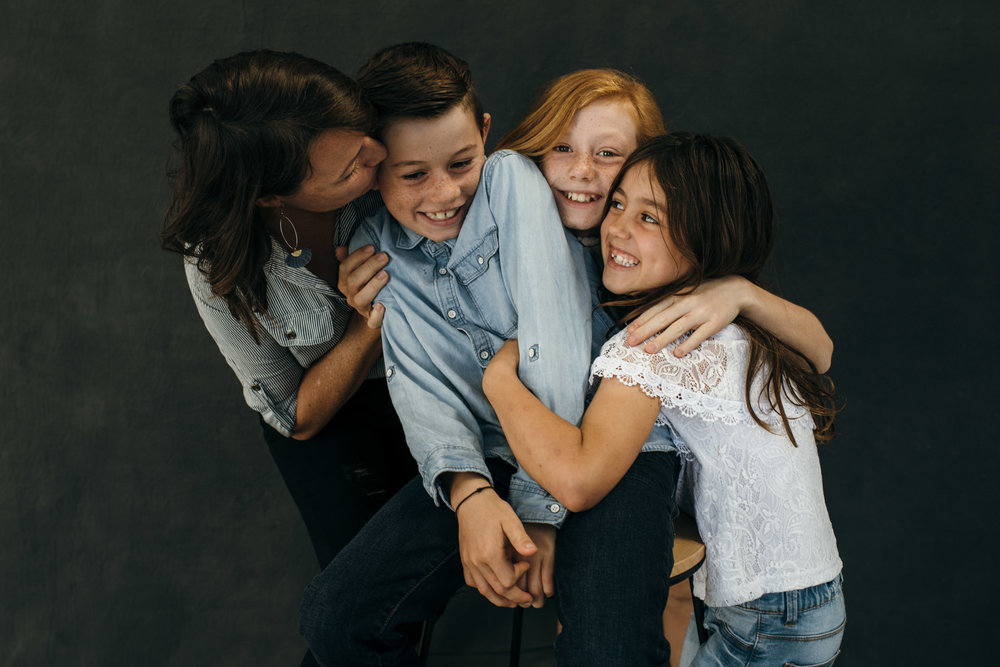

Hey, my name is Milina. I’m a mum to two daughters and a son. I was 40 when I started to really learn about my menstrual cycle and how it affected me. The more I learnt, the more ripped off I felt. I felt sad and angry that I was only just learning this, 28 years into this stage of my life. Like the vast majority of us, this knowledge just wasn’t shared, mainly because it wasn’t known.
So I went through my teens wondering what was wrong with me. Why did I have moods and energies that fluctuated so often, and why wasn’t I like all the other girls? Little known to me, we all felt the same.
My 20’s saw me taking the pill for the most part. Not entirely for birth control, but also to skip periods when I wanted. It was kind of the done thing wasn’t it, even though I had no idea of the real and lasting side effects. I didn’t even know that we only have 5-6 fertile days during your cycle. I stopped taking the pill when my body and mind no longer felt like mine, and I fell pregnant 4 months later.
I went through my years of conception with no idea when I was and wasn’t fertile. Subsequently, both of our daughters were happy little surprises.
I then went through my 30’s hiding this part of my life from all of my family. Unsure of how to acknowledge it to my daughters. Not talking about it in front of my husband, to not cause him any discomfort. And not thinking about how important it was for our son to know about.
When I learned at 40 all of the things that I’d not known before, I knew I wanted something different for my family. So I continued to learn and started to make changes. Subtle at first, with little things, like asking for alone time when I had my period, telling my family I needed more quiet and more space at this time, and bringing up conversations that had never been had.
This is just one part of what’s lead me to creating these workshops. Over the next few weeks I’ll be sharing more. Some of them are personal and raw, but they’re also important. I know by sharing them will change the way for our girls and their future.
These workshops are about more than just periods for me. They’re about women, young and old, taking the power back into our own hands. For too long we’ve been told to be quiet and put up with things that we shouldn’t be putting up with. We’ve been told the best way to heal is to numb our bodies with medication, rather than looking at causes. Learning about our bodies and our cycles, in a community setting, is one of the most empowering things we can do. And by doing so we are helping heal all of us.
Part two coming soon.
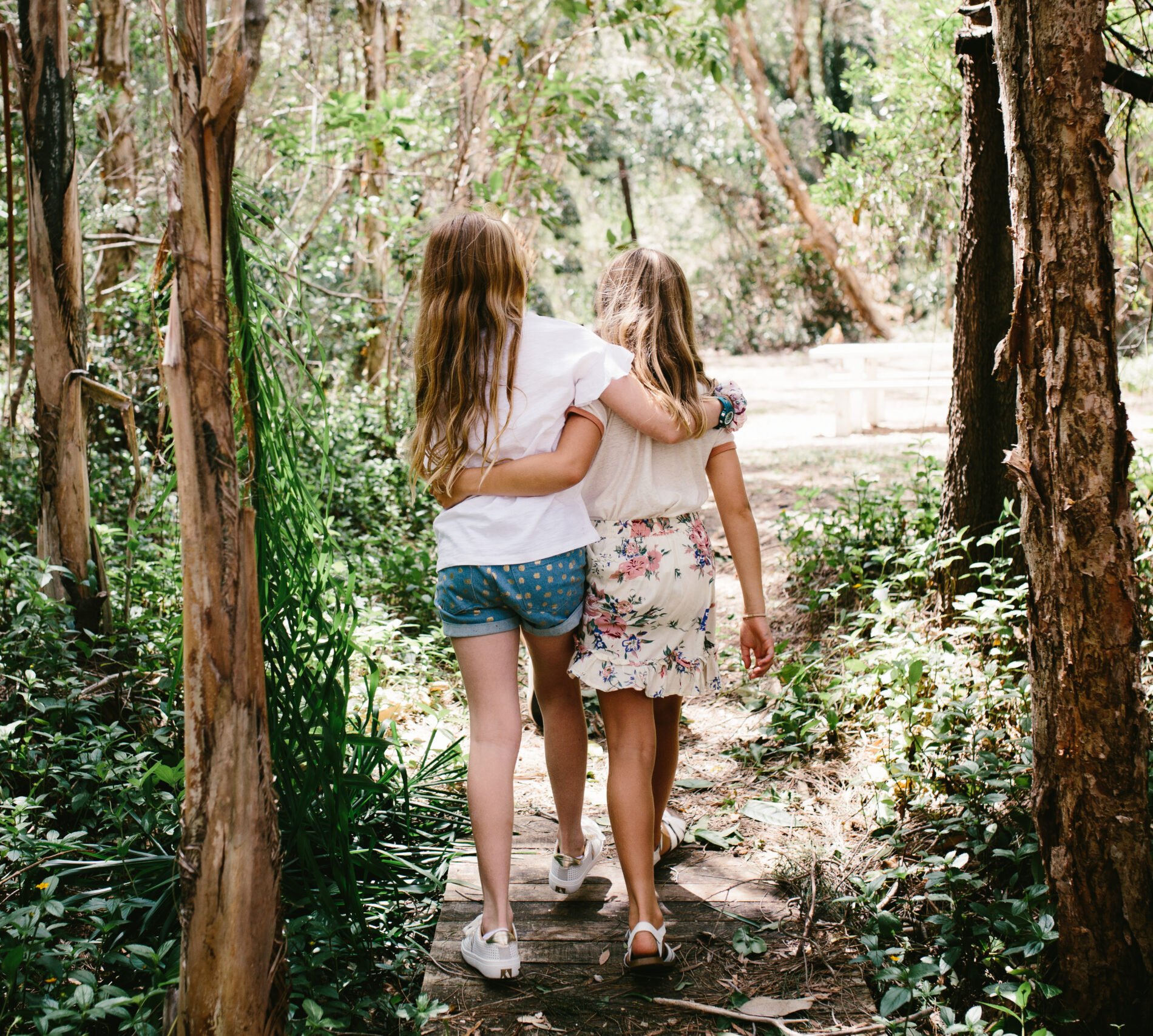
Do you remember the time before your period started? The questions you had about it? The worries and fears you had around it?
Do you remember talking to your friends about what it was like and what happened when it did come?
I don’t either!
When you’re decades into your menstruating years, you can take for granted what you do and don’t know. You’ve learned about how to deal with it in your own way, and the initial fears and worries are long gone.
Our girls have questions and worries that we’ve long since forgotten about. It’s only since asking them in a safe and anonymous way that I’ve discovered their real questions, worries and thoughts.
During the workshop, the girls get to write down any questions that have about periods. Every workshop raises new questions that I haven’t encountered before, so every workshop I’m able to build on from the one before.
When initially talking to our girls about periods, having “the talk”, we tend to think that letting them know they bleed once a month, for a few days, and this is how a pad works is enough. They’ll sit in silence, nodding, taking in what they can. But I’ve come to know that they have SOOOOOO many other questions!
So lets dive in with these real questions from your girls!


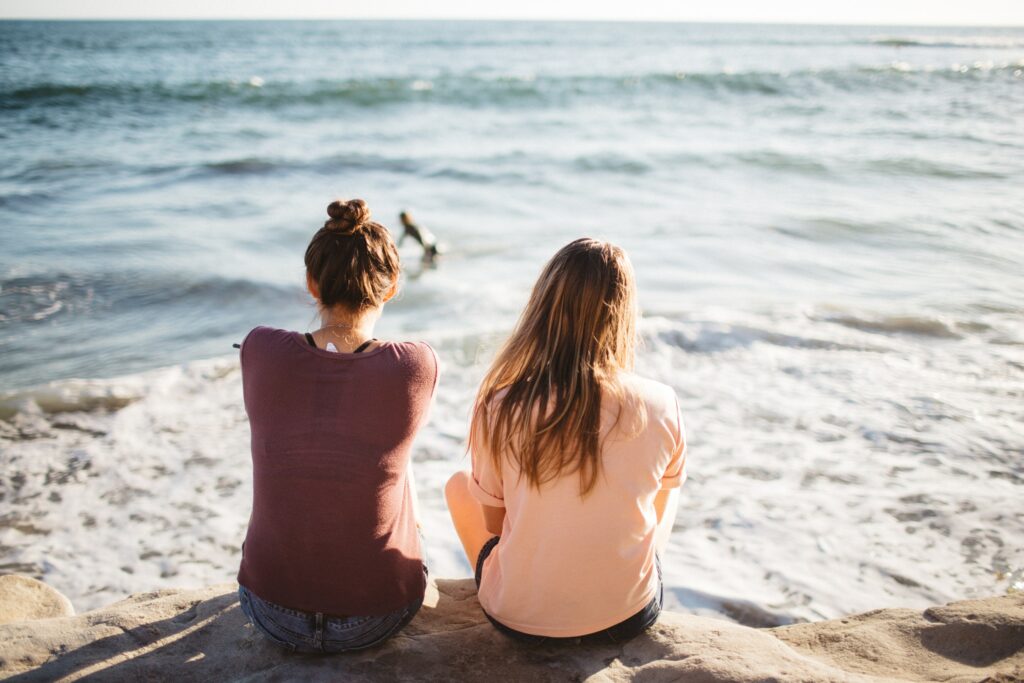
As girl’s hormones start to change, one of the changes in their body is the start and increase of cervical/vaginal fluid. This can be noticed simply by a little creamy like stain in their knickers. It’s not unusual for girls to think this is just a little bit of wee. Every girl is different, but this can occur anywhere from 6 months before she starts her period to a few years.
As she nears her period, the fluid will change again and she may feel wetter then before around her vulva and in her knickers. The last few months before she starts her period tends to be a time of increased fluid. The fluid is generally thin and clear or whitish and won’t have an odour.
 Daily washing with soap on the outside is all that’s required for personal hygiene. Nothing needs to be inserted or products used to “douche” the vagina, especially those containing fragrances. The vagina has an incredible way of cleaning itself, and using additional products can disrupt the healthy balance of bacteria and cause a host of health issues. These could include abnormal discharge, itchiness and bad odour. This is where knowing what’s normal and not normal for her will be a great indicator of her health.
Daily washing with soap on the outside is all that’s required for personal hygiene. Nothing needs to be inserted or products used to “douche” the vagina, especially those containing fragrances. The vagina has an incredible way of cleaning itself, and using additional products can disrupt the healthy balance of bacteria and cause a host of health issues. These could include abnormal discharge, itchiness and bad odour. This is where knowing what’s normal and not normal for her will be a great indicator of her health.
If it becomes uncomfortable for them, using panty liners or lower absorbency period underwear will help them.
Talking about cervical fluid is as essential as talking about our period. It’s important they know it’s normal, how much they can expect, and that once they start their period it continues as a normal part of a healthy cycle.
Cervical fluid is a sign of many things, and knowing this can be quite empowering.
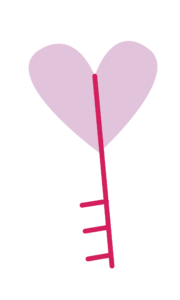 assessing cervical fluid is a more precise indicator of when our next period will start. This is because as we near ovulation our cervical fluid increases and thickens until it is near egg white consistency just before ovulation occurs. Once ovulation has happened and we enter the luteal phase of our cycle, we have 14 days until our period starts. Our cycle length changes in the follicular phase (the time between when our period starts and we ovulate). The follicular phase can vary in length anywhere from 10-16 days. However things like travel, stress and health issues can also cause this to vary more. So in a normal healthy cycle, getting to know the point of ovulation through your cervical fluid can help you better determine when your period will start.
assessing cervical fluid is a more precise indicator of when our next period will start. This is because as we near ovulation our cervical fluid increases and thickens until it is near egg white consistency just before ovulation occurs. Once ovulation has happened and we enter the luteal phase of our cycle, we have 14 days until our period starts. Our cycle length changes in the follicular phase (the time between when our period starts and we ovulate). The follicular phase can vary in length anywhere from 10-16 days. However things like travel, stress and health issues can also cause this to vary more. So in a normal healthy cycle, getting to know the point of ovulation through your cervical fluid can help you better determine when your period will start.Cervical fluid is as much an important part to our healthy cycle as our period, and getting to know this part of themselves can really help girls trust and love more about their bodies.
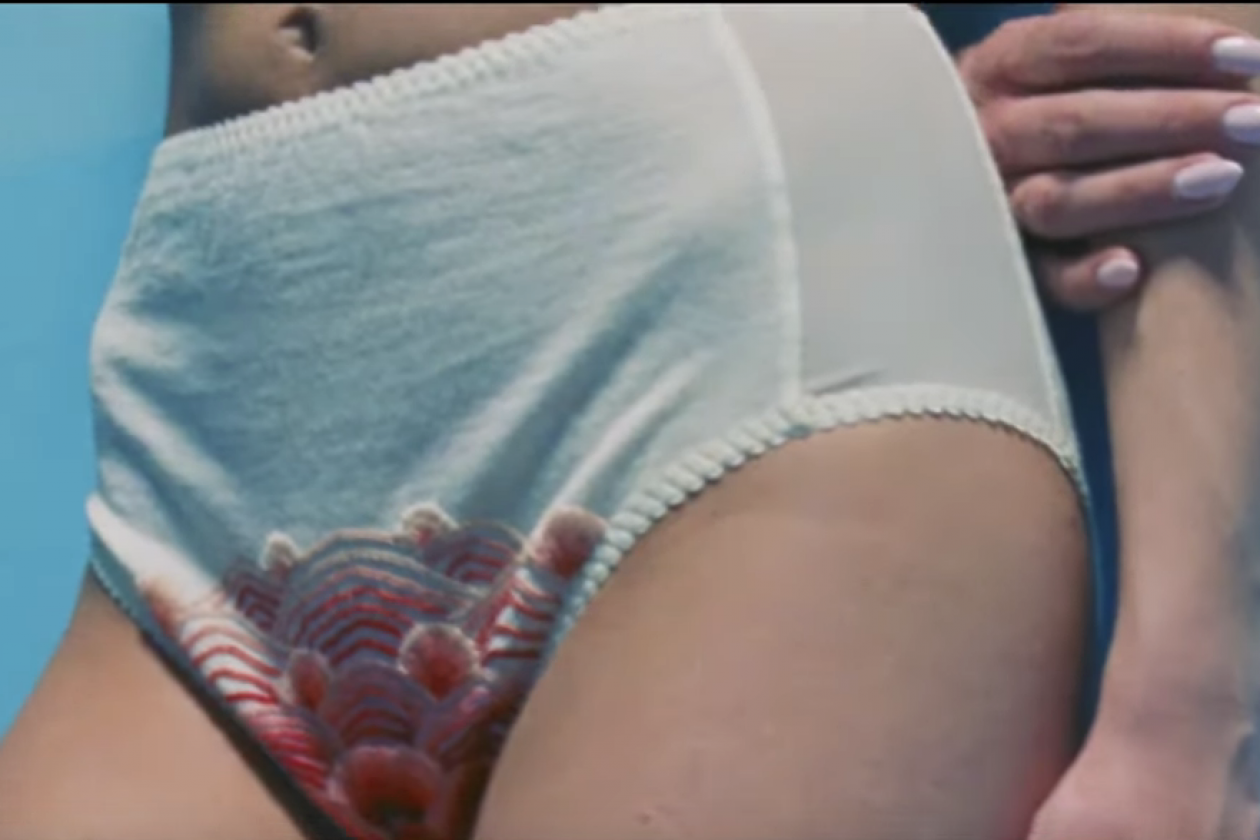
In the last month we’ve seen one of the most controversial ads on our tv screens, and in prime time. Why is this ad so controversial? Because it shows period blood. Libra have broken the norm of showing blue liquid as a replacement for period blood, and shown something that actually depicts reality, including blood streaming down a woman’s leg whilst in the shower, and a woman removing a menstrual pad.
People have been so offended by this ad that Ad Standards have received more than 600 complaints, making it the most complained about ad this year.
So what is so offensive about it? Firstly, with full transparency, I’m going to say I was a little taken aback by it when I first saw it as well. But I quickly asked myself why I felt like that, and realised it’s the old shameful beliefs we have been conditioned with. Don’t talk about it, it’s gross, it’s dirty, no-one wants to hear about it, and heaven forbid don’t let the children know!
A few weeks back Nat Kringoudis posted about it on her Facebook page. I was aghast at some the comments and some of the comparisons people were likening it to. Things like a used condom and ejaculation. I kind of don’t blame people for thinking like this, it’s the way we’ve been conditioned. But it’s time to change. With those comments aside, it’s the following comments that made me think unless we change how we think ourselves, nothing will change going forward. As I was making a quick dash to the bakery this morning (because we had nothing for school lunches), the conversation on the radio was around the complaints for this ad and why people were offended. The woman who called through was one that had complained to the Ad Standards. Her complaint was similar to what I had read on other threads. Her complaint was not for the ad itself, but more for the time slot it was allowed to be shown in, when she wanted to sit down to relax with her family and watch tv. Now she was forcefully put in a position to talk to her children about something that she was not ready to discuss. She mentioned her children were 13, 11 and 6. She’d had discussions with her 13 year old, but not with her more “conservative” 11 year old, and her 6 year old was now traumatised and had a very negative first introduction to periods.
I found this so interesting for a number of reasons. I wanted to ask her why it would be seen as negative? We are so accustomed to relating blood with pain and suffering, that someone is either injured or hurt. But a simple explanation of “this is what a healthy woman’s body does, and its not from harm or injury” could be all that is required to put a child’s minds at ease.
So let’s break this down more. The complaints I’ve seen a lot have been about the ad being shown at Prime Time, and that it’s either not appropriate for children, or that the parents should have the right to discuss periods when they are ready, not when being raised in an ad.
Prime time TV, when Home and Away is being aired with subject matters like drug abuse, arson, pregnancy caused through rape, eating disorders, infidelity. I haven’t watched Home and Away for a long time, but these were some of the subject matters when I last saw it. None of these have anything to do with how a healthy woman’s body function, yet it’s okay to show? Are conversations being had around these topics?
Prime time TV, when Bondi Rescue is being aired, with blood, vomiting, sexual misconduct and drunkeness often being shown. In my home vomiting is a big inducer of anxiety, and in my opinion, much more disgusting than period blood. But is that complained about? None of these have anything to do with how a healthy woman’s body function, yet it’s okay to show? Are conversations being had around these topics?
What about the Bachelor? Another prime time TV show where a man is making out with a number of women, or an ad is shown with a woman grinding herself on top of him while in a bikini. Is this forcing conversations also? Or do we just cover their eyes, look away and pretend nothing happened?
I’m not saying that any of these should or shouldn’t be shown, I’m just asking how is one offensive and forcing unwanted conversations, and the others not? We have become so accustomed to seeing everything else on tv, that it’s okay. Everything except period blood.
Asaleo Care, makers of Libra, said it launched the #bloodnormal campaign to try to normalise periods, break down taboos and to generate conversation.
According to the company’s research, 3 out of 4 Australian women say there is a greater stigma attached to periods than there is drugs or STIs, and a further 8 out of 10 women go to great lengths to hide their period.
Most alarmingly, their research revealed that 70 per cent of young Australian women would rather fail a class than have friends know they were on their period.
We fear what we don’t know and periods and vaginas must be one of the most feared subjects out there. We automatically think periods equal sex, but that is not the case. The more we talk about periods, and how it is part of a healthy woman’s body, the less stigma there is around it.
Put aside that it’s a sales tactic, if it takes a shocking and “offensive” ad to start the conversation, that can only be a good thing. It may be getting some mothers or older folks knickers in a knot, but it’s relieving the anxiety of the 14 year olds out there, and reassuring them that it’s okay to talk about periods, even if thats not the message they are getting at home.